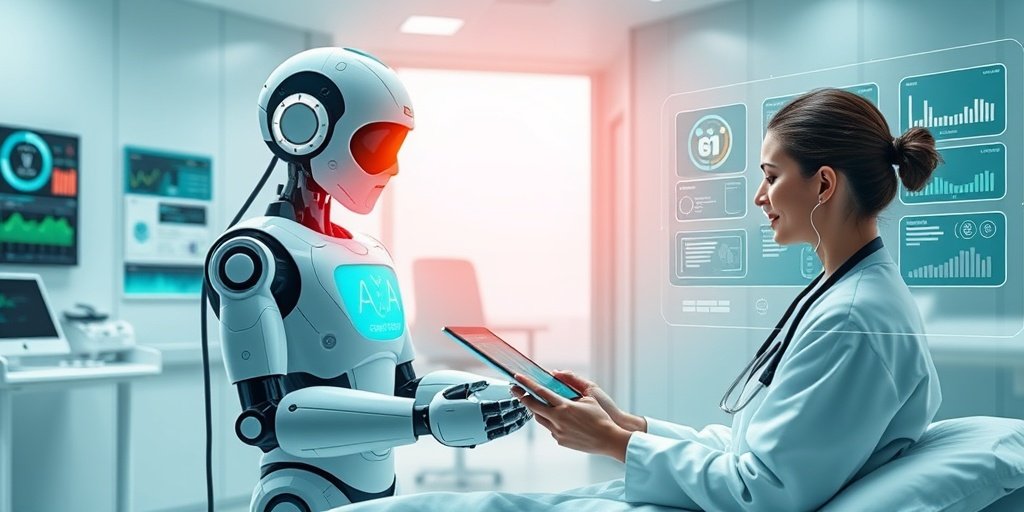⚡ Quick Summary
A recent study forecasts the evolution of smart hospitals over the next two decades, emphasizing the role of artificial intelligence (AI) and the shift towards individualized medicine and home care. The findings highlight critical challenges, including staff shortages and the need for enhanced digital skills.
🔍 Key Details
- 📅 Timeframe: Forecasting from 2027 to 2042
- 👥 Participants: 39 experts in healthcare, AI, and management
- 🔍 Methodology: Real-time Delphi study and expert workshops
- 🌐 Dimensions of smart hospitals: AI, sustainability, ecosystems, human-centeredness
🔑 Key Takeaways
- 📈 Shift to individualized medicine and home care is anticipated.
- 🤖 AI technologies will play a crucial role in enhancing patient care.
- 👩⚕️ Staff roles will evolve, requiring adaptation to new technologies.
- 📉 Staff shortages are projected to peak by 2032, posing a significant challenge.
- 🌱 Sustainability practices will be integrated into hospital operations.
- 🤝 Collaborative ecosystems will be essential for successful implementation.
- 🧠 Digital skills will need to be robust among healthcare practitioners.
- ⚖️ Ethical considerations must be addressed as technology evolves.

📚 Background
The concept of smart hospitals is gaining traction as healthcare systems worldwide seek to integrate digital technologies and artificial intelligence. However, the transition is fraught with challenges, including limited financial resources, a shortage of skilled personnel, and the need for supportive policies. Understanding how these factors will shape the future of healthcare delivery is crucial for stakeholders.
🗒️ Study
This study utilized a mixed-methods approach, combining expert workshops with a real-time Delphi study to forecast the future of smart hospitals. Conducted with 39 experts, the study aimed to explore the evolution of healthcare delivery from 2027 to 2042, focusing on the integration of AI and other digital technologies.
📈 Results
The study identified four key dimensions of a technology-enabled smart hospital: artificial intelligence, sustainability, ecosystems, and human-centeredness. Notably, the findings indicated a significant shift towards individualized medicine and home care, with healthcare personnel needing to adapt to new technologies that enhance workflow efficiency and patient engagement.
🌍 Impact and Implications
The implications of this study are profound. As smart hospitals begin to materialize, the integration of AI and digital technologies will not only improve operational efficiency but also enhance patient-centric care. However, addressing challenges such as staff shortages and the need for ethical guidelines will be essential to ensure that these advancements meet the evolving needs of healthcare delivery.
🔮 Conclusion
The findings from this real-time Delphi study suggest that the vision of smart hospitals is gradually becoming a reality. With advancements in artificial intelligence and a focus on sustainability and collaboration, the future of healthcare looks promising. However, it is crucial to tackle the challenges head-on to fully realize this vision and ensure that healthcare systems can adapt to the changing landscape.
💬 Your comments
What are your thoughts on the future of smart hospitals? How do you see AI transforming healthcare delivery? 💬 Join the conversation in the comments below or connect with us on social media:
Forecasting the future of smart hospitals: findings from a real-time delphi study.
Abstract
BACKGROUND: In concert with other digital technologies, artificial intelligence (AI) is shaping the vision of smart hospitals. The transformation into smart hospitals, however, is all but trivial due to the lack of financial and human resources, digital skills, and supporting policies. Thus, the extent to which the vision of smart hospitals will eventually become reality is uncertain. In this context, our study provides a multidimensional conceptualization of the immediate future of smart hospitals to 2042.
METHODS: This study employs an iterative mixed-methods approach, including expert workshops and a Delphi study. We conducted a real-time Delphi study to forecast the evolution of smart hospitals in 5-year steps from 2027 to 2042. A total of 39 experts in healthcare, artificial intelligence, and management participated.
RESULTS: Our understanding of a technology-enabled smart hospital in this study includes four dimensions: artificial intelligence (AI), sustainability, ecosystems, and human-centeredness. Our findings underscore the critical need to address the shortage of hospital staff and general practitioners that models predict will peak by 2032. Additionally, our results show a significant shift to individualized medicine and home care. This shift indicates that smart hospitals are expected to leverage AI and digital technologies to tailor care to each patient. Furthermore, the roles and responsibilities of hospital staff will undergo significant changes. Healthcare personnel will have to adapt to new technologies that facilitate more efficient workflows and improve patient engagement in evolving healthcare environments. The results of our study suggest a shift in care to individualized medicine and home care, with corresponding changes in the roles and responsibilities of hospital staff who will employ new technologies.
CONCLUSIONS: The findings from our real-time Delphi study suggest that the vision of smart hospitals is gradually becoming reality over the next 20 years. Advancements in artificial intelligence should enhance operational efficiency and patient-centric care, while facilitating the integration of sustainability practices and fostering collaborative ecosystems. However, addressing challenges such as staff shortages, ethical considerations, and the need for robust digital skills will be essential. A deep pool of expert healthcare practitioners, clear ethical guidelines, and robust digital skills are essential to fully realize this vision and ensure that smart hospitals can meet the evolving needs of healthcare delivery.
Author: [‘Jovy-Klein F’, ‘Stead S’, ‘Salge TO’, ‘Sander J’, ‘Diehl A’, ‘Antons D’]
Journal: BMC Health Serv Res
Citation: Jovy-Klein F, et al. Forecasting the future of smart hospitals: findings from a real-time delphi study. Forecasting the future of smart hospitals: findings from a real-time delphi study. 2024; 24:1421. doi: 10.1186/s12913-024-11895-z